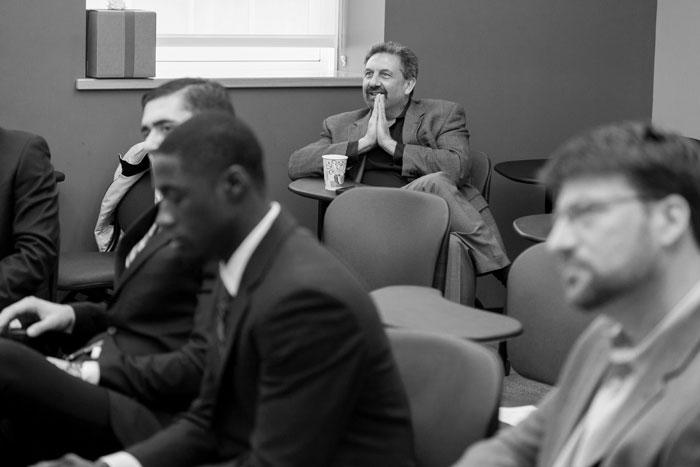Answering the Tough Questions

Jerry Wolfe '83 (rear) absorbs a student presentation as part of the international business & management senior seminar, which, in this case, found students pitching ideas to Wolfe's McCormick on how the spice company can reach the millennial generation. Photo by Carl Socolow '77.
International business & management seniors are challenged to brainstorm for corporate alumni
by Tony Moore
Remember that time Proctor & Gamble, a $243 billion company, asked you to run a targeted analysis to help wrangle its internal performance metrics? No? Maybe you were too busy with McCormick, the spice company whose products have peppered dining-room tables since 1889. Or you were pitching to Janssen Pharmaceuticals, a subsidiary of Johnson & Johnson whose medicines treat everything from Alzheimer’s disease to ADHD to epilepsy.
If none of this rings a bell, you must not have been in this fall’s international business & management senior seminar, in which students presented their research-driven ideas to executives of these companies.
The challenge
The international business & management senior-seminar project was run in three sections—one for each company—under the guidance of associate professors Helen Takacs and David Sarcone. And what students found themselves up against might have rattled seasoned pros.
For McCormick, students had to develop marketing strategies to grab the attention of millennials, that teens-to-30s group known for being civic-minded and the gatekeepers of social media. In the Proctor & Gamble group, the teams were to “identify, and develop rationales for, some key performance measures … that will improve Proctor & Gamble's relative performance.” And Janssen asked for recommendations on a strategy for one of the company’s neuropsychiatric medication’s market entry into South Africa.
Seniors Steven Haynes, Evan Pastorelle and Chris Cox tackled the question of how to get millennials into the McCormick fold, and Haynes found that the uphill nature of the battle was something he was eager to take on.
“To be honest, it was a really tough question,” says Haynes, whose team’s suggestions included McCormick partnering with the Greek system and higher-education food-service companies. “But if it was an easy question, someone would have answered it already. I think that's what makes it interesting—the fact that we got to help a Fortune 500 company try to answer the question kept us motivated throughout the challenge.”
The alumni connection
What made the project especially rewarding was that three Dickinson alumni—McCormick’s CIO and Connected Commerce Executive Jerry Wolfe ’82, Proctor & Gamble’s Vice President of Corporate Finance Gordon Wright ’83 and Joseph Hulihan ’77, Janssen’s vice president of medical affairs—were on the receiving end of the student reports, the second year running that the student-alumni link has been made for the senior seminar. And the link's significance wasn’t lost on the teams.
“That the VP of corporate finance at the largest consumer goods company in the world trusts the students at Dickinson to address a real-world problem faced by his company…” says Sara Iacovino, who worked with Wright. “That just speaks so positively to the connection alums have with Dickinson.”
And the ideas that emerged, in the form of detailed reports and oral presentations, were often just what those alumni were seeking.
“Several of the concepts are quite compelling and reflect thinking that has not manifested in McCormick with regard to growth opportunities,” says Wolfe, a 14-year McCormick veteran who hosted students at the company’s Maryland headquarters. Wolfe notes that his marketing team will be fleshing the concepts out to see if they can work for McCormick, both in terms of efficiency and the company’s scale.
Big picture
Shuwei Li '15, whose team also worked with McCormick, found that the experience took an interest of hers and helped shape it into a possible career path.
“I was interested in consulting before taking the course,” she says, mentioning that her group offered such ideas as college cookouts, adding new spices to cafeteria menus and reimagining McCormick’s social-media accounts, all aimed at getting millennials to engage with the company. “Now I’ve learned the mindsets and skills to think like a consultant, and I’m definitely considering the profession after graduation.”
Many of the teams’ ideas came from frameworks they had learned in classes outside of their major, and it’s a broad-based approach that will seem familiar to anyone who’s ever sat in a Dickinson classroom.
“The essential skill for this project was connectivity,” says Haynes. “We needed to understand the big picture, connect the dots and understand how those connections related to our ideas. Our liberal-arts background played a huge role in our creative solutions, and this project essentially embodies what a Dickinson education is about.”
Learn more
Published January 13, 2015